Iran Serious In Talks But Distrustful Of Foreigners – Top Negotiator
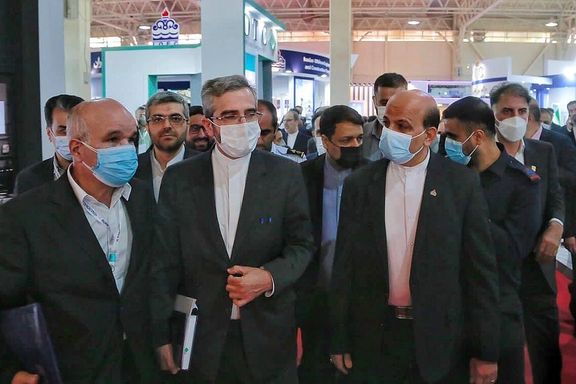
Iran’s deputy foreign minister says the country is serious in talks to revive the 2015 nuclear deal but is also determined to distrust the “enemy” and foreigners.

Iran’s deputy foreign minister says the country is serious in talks to revive the 2015 nuclear deal but is also determined to distrust the “enemy” and foreigners.
Ali Bagheri-Kani, who is also Iran's chief nuclear negotiator in Vienna talks with world powers, made the remarks on Sunday as he visited Iran Oil Show 2022 underway in Tehran, adding that Iranian scientists and industrialists of the energy sector are a major force in the country’s ability to "neutralize sanctions."
He said the "art" of circumventing sanctions was once the industry's only instrument against George W. Bush's "smart sanctions", which then turned into "technology" to counter Barack Obama's “crippling sanctions" and then into "knowledge" to thwart "sanctions imposed by Donald Trump's maximum pressure campaign."
Other countries under sanctions are now seeking to acquire "sanctions neutralization knowledge" from the Islamic Republic, he added.
Bagheri-Kani went on to say that scientists and industrialists not only empower the country’s diplomacy to foil sanctions but also boost Iran’s deterrent power to stand against such measures.
The Vienna talks came to a standstill in mid-March as major stumbling blocks between Tehran and Washington remained unresolved.
A major disagreement reportedly remains the US listing of Iran’s Revolutionary Guards (IRGC) as a ‘foreign terrorist organization’ while Iran has also refused to drop calls for retribution for the US killing IRGC general Qasem Soleimani in Baghdad in 2020.
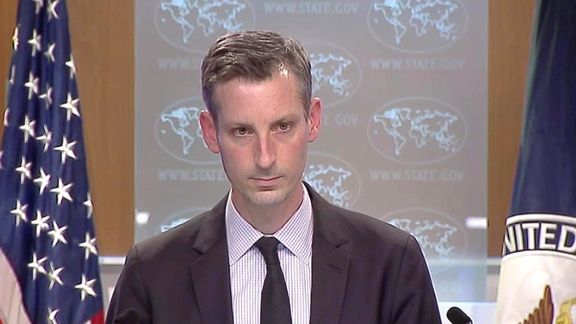
Despite Iranian and European officials expressing optimism over resumption of nuclear talks, the US response on Friday was guarded, putting the onus on Iran.
Commenting on the possibility of a final deal and whether the US would take the Revolutionary Guards (IRGC) off the list of Foreign Terrorist Organizations (FTO), the US State Department Spokesman Ned Price said Friday that that at this point a deal remained "far from certain." However, he described the resumption of conversation after several weeks of delay as important and said messages have been conveyed back and forth through the EU coordinator of the talks, Enrique Mora.
Mora was in Tehran this week to make another attempt at breaking the stalemate in the Vienna talks to restore the 2015 nuclear deal, Joint Comprehensive Plan of Action (JCOPA) which came to a pause in mid-March when Iran demanded that the IRGC be delisted.
Mora’s visit coincided with economic chaos in Iran resulting from a sudden jump in food prices followed by anti-government protests. But it is not clear if Tehran feels under pressure to make a deal and lift US economic sanctions or has decided to muddle through despite financial pressures.
"We are preparing equally for scenarios in which we have a mutual return to compliance with the JCPOA and in which we do not.It is up to Iran to decide whether it wants to conclude a deal quickly," Price told reporters.
Price on several occasions has refused to comment on the possibility of IRGC's delisting which Iran insists is a "redline", and said the US does not "negotiate in public".
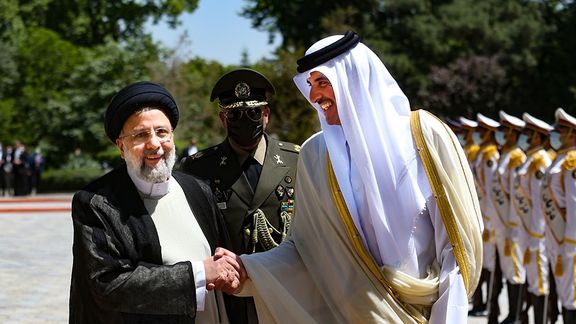
The EU's foreign policy chief, Josep Borrell told reporters at a G7 foreign ministers' meeting in northern Germany Friday that Mora's visit to Tehran has unblocked the process of negotiations. "It has gone better than expected - the negotiations were stalled, and now they have been reopened," Borrell said.
The Iranian Foreign Minister Hossein Amir-Abdollahian has also expressed optimism following Mora's two-day visit and his meeting with Iranian officials but has equally put the onus on the United States. "A good and reliable agreement is within reach if the United States makes a political decision and adheres to its commitments," he said in a tweet on Friday.
Iranian media have sounded optimistic following Mora's visit, which coincided with a visit by the Emir of Qatar, Sheikh Tamim Al Thani, to Tehran. Although there was no mention of the nuclear issue having been discussed during the Emir's visit in Iranian media, pundits says his mediation between Tehran and Washington could have a positive role in the future of the talks and help break the deadlock.
"The Qatari Emir's visit could be [an attempt at] creating a new mechanism and ending the stalemate in the talks between Iran and 4+1 countries in Vienna," international affairs expert Hasan Hanizadeh wrote in a commentary entitled "Resolution of the stalemate in Talks" in reformist Arman-e Melli newspaper Saturday.
"The Emir's extensive relations with European powers and the US can have a positive impact on the outcome of the Vienna talks," Hanizadeh wrote.
In an interview with Arman-e Melli on Saturday, another international affairs expert, Morteza Makki, said besides Qatar, Iraq and Oman are trying to bring the nuclear talks to a conclusion. "These are signs that there is a collective will to restore thee JCPOA and these diplomatic moves together may help make a success out of Enrique Mora's visit," he said. "It looks like Enrique Mora was given a green light when he came to Tehran and that Tehran has shown flexibility and wants to hear out the other side's arguments," he said.

A claim by Josep Borrell, European foreign policy chief, that EU envoy Enrique Mora had “unblocked” Iran nuclear talks sits uneasily with Washington’s expectations.
Borrell said in Germany Friday that Mora’s trip to Tehransince Tuesday had been “positive enough” after the envoy called his meetings in Iran “better than expected.” Mora has chaired year-long nuclear talks in Vienna.
A US State Department spokesman told Iran International late Thursday that Washington welcomed Mora’s “efforts to bring these negotiations to a successful conclusion” but said that the US continued to believe that “Iran needs to make a decision,” and that with talks to revive the 2015 Iran nuclear deal (the JCPOA, Joint Comprehensive Plan of Action) paused since March, the spokesman insisted Tehran need to make a clear choice.
“We are not negotiatingin public, but if Iran wants sanctions lifting that goes beyond the JCPOA, they will need to address concerns of ours beyond the JCPOA,” the spokesman said. “Conversely, if they do not want to use these talks to resolve other bilateral issues beyond the JCPOA, then we are confident that we can very quickly reach an understanding on the JCPOA...”
A State Department spokesperson was quoted by Barron's on Friday as thanking Mora for his efforts but adding, "That said, at this point a deal remains far from certain."
The Vienna talks have struggled to agree which US sanctions – including those introduced since Washington left the JCPOA in 2018 – violate the agreement, and exactly how Iran should return its nuclear program, expanded since 2019, to JCPOA limits. A major disagreement reportedly remains the US listing Iran’s Revolutionary Guards (IRGC) as a ‘foreign terrorist organization’ while Iran has also refused to drop calls for retribution for the US killing IRGC general Qasem Soleimani in Baghdad in 2020.
IRGC Issue ‘Beyond The JCPOA’
The State Department spokesman told Iran International Thursday that Washington considered Iran’s request to delist the IRGC as one of several “bilateral issues beyond the JCPOA.” Hence, said the spokesman, “if Iran wants sanctions lifting that goes beyond the JCPOA, they will need to address concerns of ours beyond the JCPOA.”
Iran has given no sign it is drawing back from its insistence that the US is preventing JCPOA revival by insisting on measures incompatible with the agreement including – Tehran says – the IRGC listing.
In a tweet Friday, Iranian foreign minister Hossein Amir-Abdollahian described Mora’s visit as “another opportunity to focus on initiatives to resolve the remaining issues” while adding that “a good and reliable outcome” was “within reach if the US makes is decisions & adheres to its commitments.”
Echoing Mora’s guarded optimism, a German Foreign Ministry spokesperson said Friday there was “a proposal on the table that is very fair for all sides." But in suggesting Iran needed to “refrain from demands that go beyond the JCPOA” in order to bring “an early conclusion to these talks” the spokesman apparently reflected the US position.
Has the EU squared the circle? In announcing a positive outcome to this week’s contacts, Borrell and Mora may be suggesting Tehran has agreed to continue engagement– possibly through a new process – rather than shifting its position.
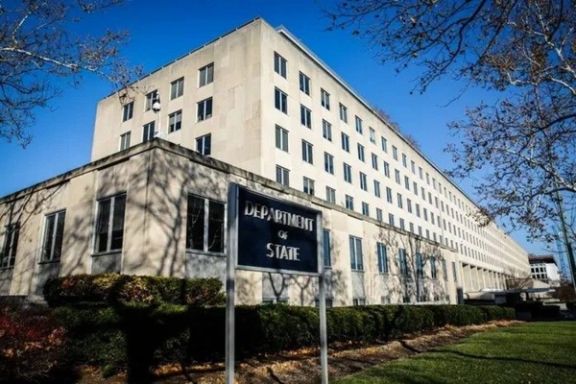
A US State Department spokesperson has told Iran International that Washington is still interested in reviving the 2015 deal but is also preparing for alternative scenarios with its allies.
The spokesperson made the remarks on Thursday against the backdrop of visits to Tehran by the European Union’s coordinator of the nuclear talks, Enrique Mora, and Qatar’s ruler, Emir Sheikh Tamim bin Hamad Al-Thani. “The administration, along with our Allies, is preparing equally for scenarios with and without a mutual return to full implementation of the JCPOA.”
About the trips by Mora and Al-Thani, the spokesman said Washington is in close contact with the EU coordinator, who continues to convey messages back and forth, and appreciated “the constructive role Qatar has played in our efforts to achieve diplomatic resolutions of important and difficult issues between the US and Iran, including the unjust detention of US citizens and our effort to achieve a mutual return to full implementation of the JCPOA”.
In response to a question about Iran’s demand to remove the Revolutionary Guard (IRGC) from the list of Foreign Terrorist Organization, the spokesperson said that "if Iran wants sanctions lifting that goes beyond the JCPOA (the Joint Comprehensive Plan of Action), they will need to address concerns of ours beyond the JCPOA”.
The official added, “Conversely, if they do not want to use these talks to resolve other bilateral issues beyond the JCPOA, then we are confident that we can very quickly reach an understanding on the JCPOA and begin reimplementing the deal”.
On Friday, the EU's foreign policy chief Josep Borrell said Mora’s trip has unblocked the negotiations, expressing hope for the prospect of reaching an agreement.
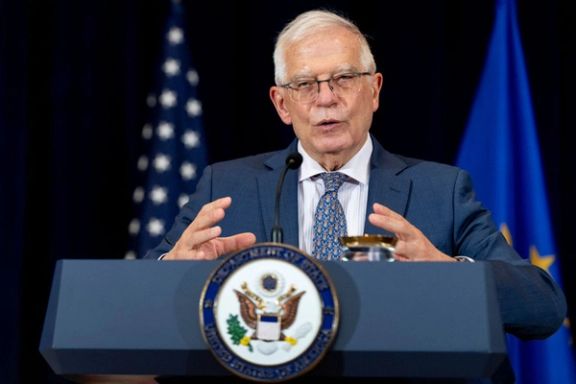
The EU's foreign policy chief says the trip by the coordinator of the talks to Tehran has unblocked the negotiations to revive the 2015 nuclear deal between Iran and world powers.
Josep Borrell made the remarks at a G7 meeting in northern Germany on Friday as Enrique Mora arrived back in Europe, saying he believes that two months of deadlock in diplomatic efforts has ended.
He described Iran's response as being "positive enough" after Mora had delivered a message that things could not continue as they were, describing his trip as “better than expected.”
He did not say what "unblocked" means and if the suspended talks in Vienna will resume.
"These things can not be resolved overnight. Let's say the negotiations were blocked and they have been unblocked and that means there is the prospect of reaching a final agreement."
Enrique Mora arrived in Tehran for a two-day trip on Tuesday and met with Ali Bagheri-Kani and other Iranian officials, but with no news about the results of the meeting until late evening in Iran.
Talks to restore the deal with world powers have stalled since March, chiefly over Tehran's insistence that Washington remove the US designation of Foreign Terrorist Organization of Iran’s Revolutionary Guard (IRGC), which is the only example of a sovereign state’s armed forces to be included.
A member of Iran’s nuclear negotiating team said on Thursday that removing the terrorist designation of the IRGC is not enough and Tehran wants other guarantees.
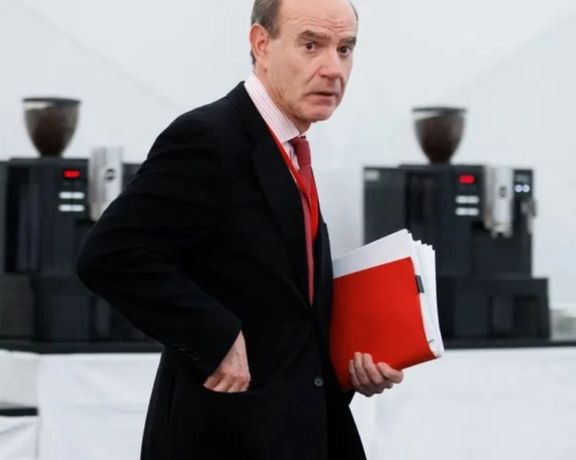
The European Union’s coordinator of the nuclear talks was briefly detained with colleagues at Frankfurt Airport as he was returning to Brussels from Tehran after two days of talks.
Enrique Mora said in a tweet on Friday that “not a single explanation” was given to him, adding that they airport police also took his passport and phones.
The Spanish diplomat criticized the breach of diplomatic rules, emphasizing that he is “an EU official on an official mission holding a Spanish diplomatic passport”.
About an hour later, he said on twitter that he was released. “Now released along with my two colleagues, the EU ambassador to UN Vienna and the head of the EEAS (the European External Action Service) Iran task force”.
Mora added that they “were kept separated” during the short detention and denounced “the refusal to give any explanation for what seems a violation of the Vienna Convention”.
Moreover, Mora said, “While still waiting for continuing my trip to Brussels I want to underline that in Tehran I raised the need to stop execution of Ahmadreza Djalali and asked for his release on humanitarian grounds”.
His comment about Djalali was among the few bits of information that was announced by any official about the content of his meetings in his two-day trip to Iran.